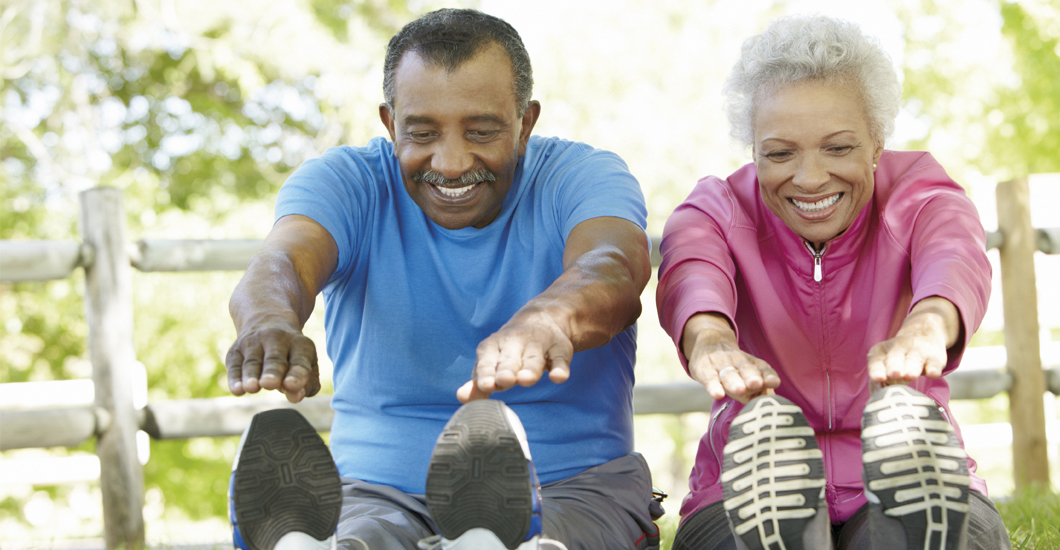Before starting a physical training program, you must be confident in what you can and cannot do. Just like medication, it is necessary to establish the proper dose of exercise that is healthy, and not counterproductive.
Do not exercise if you have a chronic illness
Medical research has shown that our bodies deteriorate from being inactive, not the aging process. In fact, being active prevents a group of chronic diseases (joint pain, hypertension, diabetes mellitus, high triglycerides) that result from the deterioration of various organs caused by spending too much time being inactive.
Moreover, the desired changes in weight and size that are achieved through exercise are nothing more than the result of the metabolic adjustments of a body in motion, and they entail better cardiovascular, respiratory, and muscular functioning. One of the biggest benefits of exercise is that the body burns more energy during involuntary processes (breathing, body temperature, movement, hormone secretion) which take place for several hours after the body is done sweating, while forcing the heart to pump more blood per minute to carry more oxygen to the muscles. This increases the diameter of the coronary arteries, improves circulation in the smaller vessels (microcirculation), and strengthens the heart as a blood pump booster. Exercise also raises HDL cholesterol (good), significantly reduces triglycerides, and is the best medicine for controlling mild and moderate hypertension. Therefore, it should be part of the treatment for chronic diseases.
If it doesn't hurt, it's not good exercise
Quite the opposite. Good exercise should never cause pain, and if there is some discomfort, it is because it is not done properly. In stretching exercises, for example, you should not make quick movements, but go slowly and maintain the correct position, explains Andrés Hernández, assigned sports doctor at Colsanitas. You also should not stretch any joint beyond a normal and reasonable range of motion. Stretching as far as the body can without feeling pain is recommended. Breathing plays a decisive role, because it indicates whether you are working too hard. Ideally, you should never have shortness of breath or difficulty breathing. This a good measurement for enjoying sports in a healthy way.
The more you do, the better
Don't attempt to do in a day what you have not done in a year. Doing exercises too abruptly, or worse, constant and explosive repetition of exercises in a short period of time (as in the case of weekend athletes) are harmful, and they present the highest risk of injury and sudden death by heart attack. Physical exercise, as well as food, sleep, or medications, have special prescriptions and, in turn contraindications. In addition, they must be adjusted to age, health status, habits, and preferences. Experts recommend at least 30 minutes of moderate physical activity a day, five days a week. Find out what works best for you, and complement aerobic exercises with strength and flexibility exercises. See a doctor to determine the body's ability and maximum capacity before beginning an exercise program, because it is not advised to exceed the body's capacity. The key to a good outcome depends not on an intense and extreme exercise session, but other indicators such as regularity, consistency, and moderation. Good physical fitness is acquired gradually.
Exercising with plastic clothing, = more weight loss
One of the common misconceptions is believing that if one sweats a lot, more pounds are lost. Using belts, creams, or nylon or plastic sweatshirts causes dehydration and a loss of electrolytes, but not fat. In addition, it is counterproductive, because severe dehydration can lead to cramps, dizziness, fainting, and loss of consciousness. Keep in mind that during the first half hour of physical activity such as jogging, bicycling, swimming, or skating, the body uses mostly carbohydrates (sugars) for energy, and only a tiny proportion of fats. The body begins to use a little more stored fat as fuel only when the 'moderate' exercise lasts longer than 45 minutes, and the carbohydrate reserves are depleted. For this reason, expecting to lose several pounds by sweating for only half an hour every third day is a fantasy. The surest way to lose weight or stay thin and healthy is with a reduced-calorie diet and an increase in energy expenditure. Your diet should be determined according to your individual needs and lifestyle; it isn't the same for everyone.
Going out hungry, or with a full stomach
You should not eat so much that you can't move, nor so little that you feel weak; that is to say, you should neither be hungry nor full before exercise. This is the key when talking about what to eat before exercising. When activity is demanding and prolonged and is done with an empty stomach, the body runs out of fuel, which causes dizziness, weakness, pale skin, and fainting. But when you exercise with a full stomach, the body focuses its blood flow on the digestive tract to break down the food, at the same time that the muscles demand more blood for oxygen and maintaining rhythm. Faced with this internal fight for blood, the metabolism may become paralyzed, and possibly cause a lack of oxygen. The ideal scenario is to eat a light meal half an hour before you begin your activity, and drink water to maintain adequate hydration. It is very important not to wait to be thirsty before you start drinking water, because by that time more than five percent of the body's total percentage of water has been lost, which is enough to alter the body's functions. If you prefer getting up early, it is not necessary to have breakfast first when you are not exercising for more than 45 minutes, but when you are done, it is essential to replenish the fluids and mineral salts that are lost through sweat and urine. When the activity is prolonged, like when playing a game of football or tennis, you must drink water or a hydrating beverage to replenish your fluids during the game. And if you exercise at a low intensity, it's fine to eat a light snack (banana, tangerine, cereal bar) during the exercise.
Do not do strength training
It is not strange to hear in the gyms that strength training, either with weights or repetitions, makes body fat harden. However, this is impossible, because fat will not harden or be removed through urine or sweat, as some people think. The process is the opposite. The best way to burn fat is by increasing muscle mass. The reason is that the only fat 'burners' in the body are in the mitochondria fibers found in muscles. In consequence, the less muscle you have, the less fat you burn. For this reason, it is recommended to do strength training exercises at least twice a week and under medical supervision to prevent overexertion, which can cause injury. Additionally, this routine strengthens bones, prevents injury, protects joints, and contributes to more calorie expenditure when at rest.


